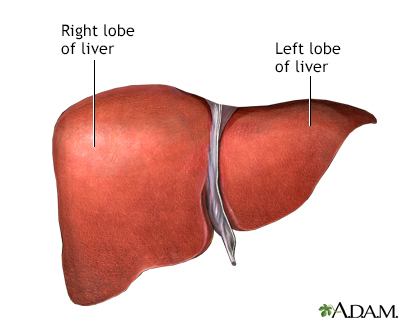Definition
Alpha-1 antitrypsin (AAT) deficiency is a condition in which the body does not make enough of AAT, a protein that protects the lungs and liver from damage. The condition can lead to chronic obstructive pulmonary disease (COPD) and liver disease (cirrhosis).
Alternative Names
AAT deficiency; Alpha-1 protease deficiency; COPD - alpha-1 antitrypsin deficiency; Cirrhosis - alpha-1 antitrypsin deficiency
Causes
AAT is a type of protein called a protease inhibitor. AAT is made in the liver and it works to protect the lungs and liver.
AAT deficiency means there is not enough of this protein in the body. It is caused by a genetic defect. The condition is most common among Europeans and North Americans of European descent.
Adults with severe AAT deficiency will develop emphysema, sometimes before 40 years of age. Smoking can increase the risk for emphysema and make it occur earlier.
Symptoms
Symptoms may include any of the following:
Exams and Tests
A physical examination may reveal a barrel-shaped chest, wheezing, or decreased breath sounds. The following tests may also help with diagnosis:
Your health care provider may suspect you of having this condition if you develop:
- COPD before age 45
- COPD but you have never smoked or been exposed to toxins
- COPD and you have a family history of the condition
- Cirrhosis and no other cause can be found
- Cirrhosis and you have a family history of liver disease
Treatment
Treatment for AAT deficiency involves replacing the missing AAT protein. The protein is given through a vein each week or every 4 weeks. This is only slightly effective at preventing more lung damage in people without end-stage disease. This procedure is called augmentation therapy.
If you smoke, you need to quit.
Other treatments are also used for COPD and cirrhosis.
Lung transplant can be used for severe lung disease, and liver transplant can be used for severe cirrhosis.
Outlook (Prognosis)
Some people with this deficiency will not develop liver or lung disease. If you quit smoking, you can slow the progression of the lung disease.
COPD and cirrhosis can be life threatening.
Possible Complications
Complications of AAT deficiency include:
When to Contact a Medical Professional
Contact your provider if you develop symptoms of AAT deficiency.
References
Han MK, Lazarus SC. COPD: diagnosis and management. In: Broaddus VC, Ernst JD, King TE, et al, eds. Murray and Nadel's Textbook of Respiratory Medicine. 7th ed. Philadelphia, PA: Elsevier; 2022:chap 64.
Hatipoglu U, Stoller JK. a1 -antitrypsin deficiency. Clin Chest Med. 2016;37(3):487-504. PMID: 27514595 pubmed.ncbi.nlm.nih.gov/27514595/.
Winnie GB, Boas SR. a1 -antitrypsin deficiency and emphysema. In: Kliegman RM, St. Geme JW, Blum NJ, Shah SS, Tasker RC, Wilson KM, eds. Nelson Textbook of Pediatrics. 21st ed. Philadelphia, PA: Elsevier; 2020:chap 421.



